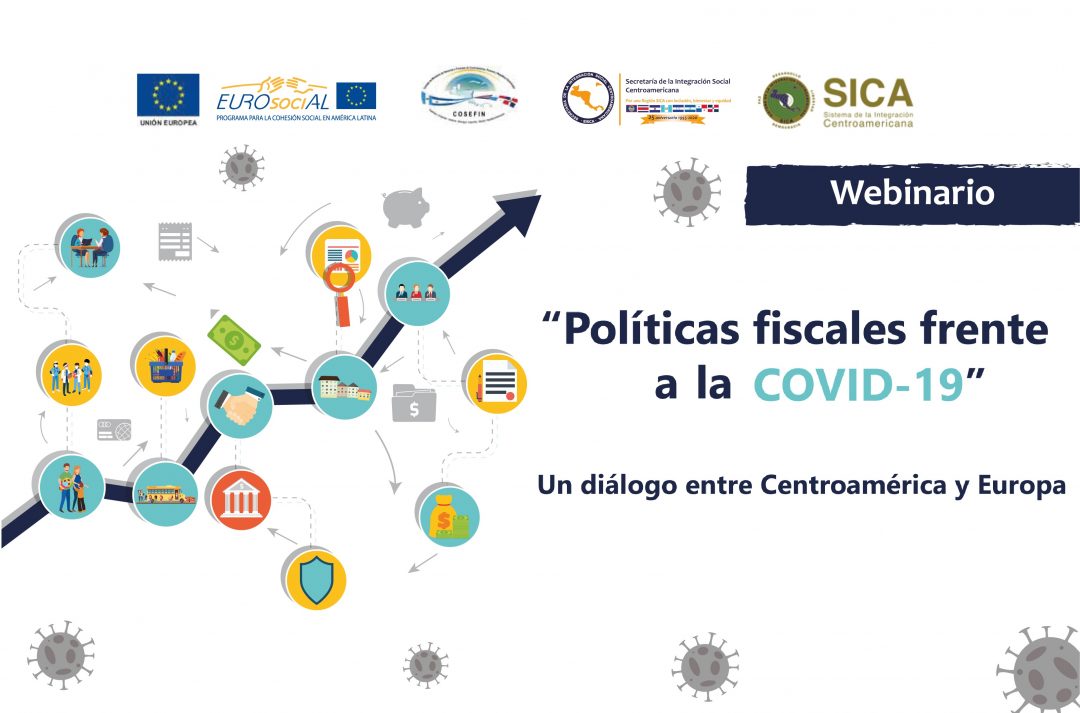The EUROsociAL+ Programme, in coordination with the Secretariat for Central American Social Integration - SISCA, carried out a cycle of webinars to promote reflection between the European Union and Latin America on different fiscal policy measures aimed at providing short, medium and long term responses to the COVID-19 crisis

The COVID-19 crisis has had worldwide impacts across all the dimensions relating to development, especially health, economic, and social development. Although we are facing a global challenge, the negative effects of the crisis are expected to be much more serious for the most vulnerable social sectors, with a dramatic increase in poverty levels, and the exacerbation of inequalities, both between people and between countries.
In this context, fiscal policies have become a key tool to limit and mitigate these negative impacts. The attention given by public health systems has been the main means of containing the health crisis, while it is expected that various fiscal policy measures, both to do with taxes and public spending, will mitigate the economic and social impacts.
With the aim of promoting dialogue between the European Union and Latin America, and carrying out a rigorous analysis of the fiscal policy strategies aimed at mitigating the effects of the crisis, the EUROsociAL+ Programme, the European Commission’s Programme for Social Cohesion in Latin America, in coordination with the Secretariat for Central American Social Integration – SISCA, has organised the Cycle of Web Seminars “Fiscal Policies in the Context of the COVID-19 Crisis”:
The first seminar, held on 7 May under the title “Fiscal Policies to Combat the Economic and Social Impact of COVID-19”, was aimed at sharing the main fiscal responses (tax, budgetary, financial, and social policy) adopted in Latin America and the European Union to face the effects of the health, economic, and social crisis.
The second seminar, which was held on 12 May addressing the theme “New Fiscal Pact, Counter-Cyclical Fiscal Policies, and the New Role of the Public in the Recovery”, studied in depth the fiscal policies necessary over the medium and long term after overcoming the health emergency, for economic and social recovery.
In the third seminar, held on 14 May under the title “Fiscal and Financial Cooperation in Middle-Income Countries”, the role of international cooperation in supporting the countries most affected by the COVID-19 crisis was discussed, along with the specific problems of middle-income countries.
The main regional and multilateral institutions and organisations in the field of Public Finance in Latin America participated in giving these papers and presentations, as well as in the different sessions, along with experts from the European Union and Latin America; representatives from COSEFIN, CIAT, ECLAC, OECD, IDB, ICEFI, CAF, CABEI, and the IEF – Spain, in addition to internationally renowned academics and specialists and senior public officials from Latin American Ministries of Finance.
From among the main conclusions it is worth highlighting the consensus on the need to reach, at both the national and regional levels, a new fiscal pact that redefines the role of the public in both the first response and recovery phases, as well as the instruments required to develop counter-cyclical fiscal policies that allow a solid and inclusive exit from the crisis; a fiscal pact that is based on transparency, information to citizens, confidence-building, and social cohesion.
This fiscal pact should be carried out with a clear focus on rights and good fiscal governance, with an analysis of the differentiated impacts on the basis of gender that the different measures entail. Also, it should count on both national and sub-national, and on regional (supra-national) organs of power. This fiscal pact must promote better collection efficiency allowing the release of more public resources, greater tax equity, as well as guaranteeing the quality of public spending that, without a doubt, must be increased to protect those areas or sectors of population and business which need it most and that ensure a greater multiplying effect in the recovery.
The commitment of international financial institutions, with the coordination of cooperation measures and with the allocation, under different modalities, of extraordinary financial resources, will also be essential so that the most vulnerable countries can count on greater resources to face the crisis.
The EUROsociAL+ Programme, through its Democratic Governance Policies Area, will be accompanying the Latin American countries in the response that, both from tax policies and from public spending, are being articulated in the face of the crisis, thereby contributing to the common European response that, in the face of the COVID-19 crisis, the European Commission is currently coordinating.



